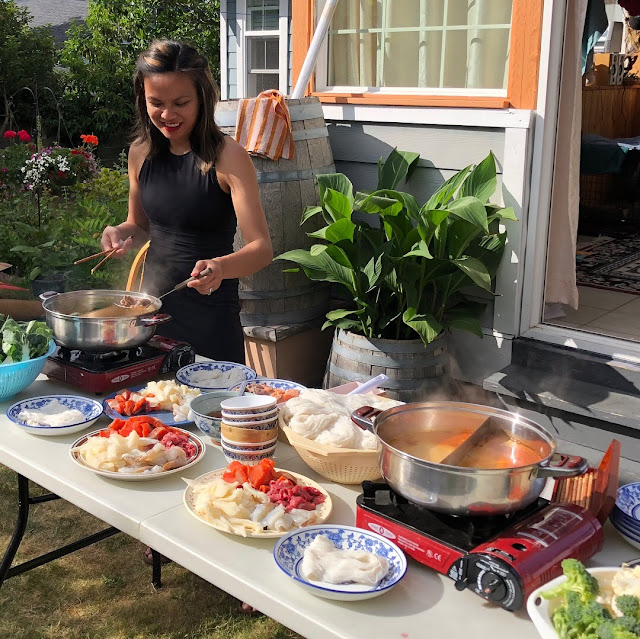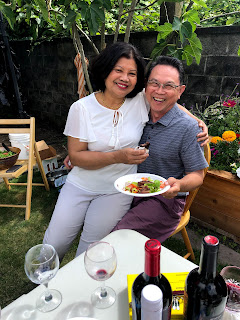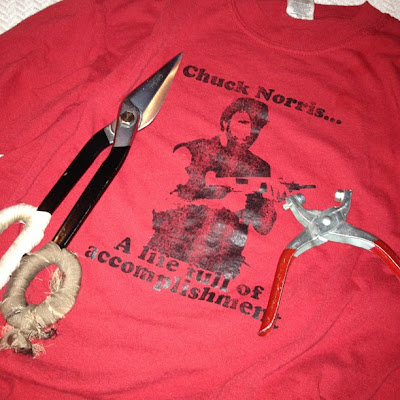Yao Hon
The journey from my house to my parent’s house is 124 km,
includes a ferry ride and takes just over 4 hours. I often treat the ferry
voyage as an exclusive cruise through the beautiful clustered display of the
Gulf Islands. I like to observe all the homes on the cliff of each island and
wonder about their stories. Do people live in those homes all year round? Are
they merely vacation homes? If it’s a permanent residence, what do the people do
for work? What kind of work is available on the island? Could my parents retire
there? It would be a faster trip to see them than going all the way from
Coquitlam to Victoria.
I love that trip though, especially when it ends with a greeting from my parents who pretend they were not waiting for my arrival the entire time. There is a sigh of relief that finally I arrived, as I embrace them with a big warm hug. My mom wears the scent of freshly cooked jasmine rice. There is always a meal waiting for me, even when I tell her not to worry and that I have eaten. Cambodians tend to avoid public displays of affection like hugging and kissing. Growing up my parents showed their affection through food. Food is how I have always known I’ve been loved. However, since moving out of my parents’ house they double their affection through food and now hugs. The distance and absence naturally solicit our need to be embraced.
I love that trip though, especially when it ends with a greeting from my parents who pretend they were not waiting for my arrival the entire time. There is a sigh of relief that finally I arrived, as I embrace them with a big warm hug. My mom wears the scent of freshly cooked jasmine rice. There is always a meal waiting for me, even when I tell her not to worry and that I have eaten. Cambodians tend to avoid public displays of affection like hugging and kissing. Growing up my parents showed their affection through food. Food is how I have always known I’ve been loved. However, since moving out of my parents’ house they double their affection through food and now hugs. The distance and absence naturally solicit our need to be embraced.
I moved away from the quiet capital city of Victoria, British Columbia and towards
the big city of Vancouver for the Fashion Design and Technology Program at
Kwantlen University when I was 20 years old. I was filled with excitement, possibility,
and adventure. Not only was I out of my parent’s house, I was in a completely
different city; two car rides and a ferry away. I enjoyed my independence but the
hardest adjustment for me was missing my mom’s food. Home cooked meals were a vital
practice in our house. Our family didn’t eat out at restaurants while I was
growing up; there was no need because everything my mom cooked was better than
anything a restaurant could deliver. As an eager learner she even made
spaghetti, a recipe she acquired firsthand from an Italian man my dad met in
one of his many random encounters with strangers, who end up being his friends.
I truly longed for my mom’s food the first few weeks of
living alone. I tried to mimic her recipes, but they didn’t taste the same. Maybe
love really does elevate food and as humans our senses can taste it and
appreciate it. Or maybe it was just because I didn’t use MSG.
My favorite meal is Yao Hon, a Cambodian Hot Pot, best
enjoyed in large groups with two or more pots of broth boiling fresh
ingredients. Visually it is a showstopper, bite size pieces of raw bright pink salmon,
jumbo prawns cut down the centre to resemble butterflies and thinly sliced beef
are fanned on a tray, one tray for every 6 dinner guests. The vibrant green hues of broccoli,
parsley, green onion, and bok choy are displayed in deep serving bowls
overflowing with their abundance. The rice noodles are precooked and assembled
into individual portions that resemble circular balls of yarn. The center piece
is a steel bowl full of rich bubbling broth creating airy vapors on top of a
portal gas stove powered by a butane canister.
The aromatic smell of lemon grass, limes leaves, garlic, red peppers,
fish sauce, and coconut milk waft in the air. Instantly my mouth waters
anticipating the combination of spicy, sour and sweets flavours.
My parents didn’t grow up enjoying Yao Hon. It wasn’t a part
of Cambodian cuisine when they were young. I imagine hot pot was a concept brought
to Cambodia by the Chinese and Koreans in the 80’s as they helped rebuild after
the Khmer Rouge Regime. Yao Hon was introduced to my parents in 1987 when they
visited friends in Seattle. My mom challenged herself to replicate the beautiful
display of fresh meat, vegetables and fragrant broth at home for our family
and friends in Victoria. It was a huge success and has been the most requested
meal for the last two decades.
When my mom makes Yao Hon, it is a family affair. Both my
aunts come over and help prepare all the delectable ingredients. My older aunt
cleans and cuts the vegetables, while filling us in on all the work gossip. My
younger aunt slices uniformed pieces of beef, prawns and salmon with ease and precision.
She works with my older aunt at a hotel in downtown Victoria and agrees with my
aunt’s observations about their co-workers. My mom is hovering over her broth
on the stove, tasting her wooden spoon every 2 minutes to make sure the
flavours are developing. They laugh and cackle until all the prep work is done;
broth completed, meat and seafood fanned, noodles put together, and vegetables
washed and ready for display.
The table is set with all the scrumptious ingredients for
the meal. Cutlery, plates, wine glasses and shot glasses are arranged at each
table setting. There is nothing better than a shot of fiery whiskey after the
first bite of salmon, and noodle in spicy broth. My mom throws in the protein
and vegetables after the portable gas stove is lit, and the broth starts to
boil. Everyone watches excitedly as the ingredients cook, swirling and bouncing
in the bubbling broth. There are always more guests than chairs and table
settings. Children and non-whiskey drinkers make their plates; a portion of noodles,
and a generous ladle of broth, cooked vegetables, beef and seafood on top, and then
move to the living room where there is more space and seating. Depending on my
mood I have joined both the whiskey drinkers and whiskey escapers.
Yao Hon is reserved for special occasions like Christmas, birthdays
and anniversaries. After too many months apart, my mom also likes to make Yao
Hon when my husband and I and our kids visit. It is a meal made for
celebration. These dinners have also facilitated many conversations about my
family’s journey from the Communist period in Cambodia. I learnt once that my thick
burly built Uncle Khonn, was a Khmer Rouge Soldier; a choice he made to survive
the regime, be one of them or be killed by them. My other Uncle Lorn, who I
look up to like a big brother was part of the Khmer Rouge’s Child Soldiers,
children that were taken away from their parents and raised by Khmer Rogue to
be resourceful, heartless killing machines. Uncle Lorn was not a good Child Soldier
because he kept running away. “They would beat me so hard when I got back
there. It hurt for days. But that didn’t stop me. I didn’t want to be there.”
He laughs.
The more shots of whiskey the more insights blurted out as
if they were in group therapy sessions. And it is therapy, the warmth of the
broth, the tender sliced beef cooked medium rare, the hearty rice noodles soaking
up all the flavours, it is comfort and love in a bowl.



Comments